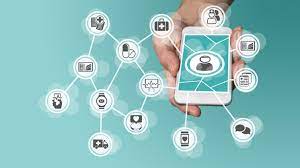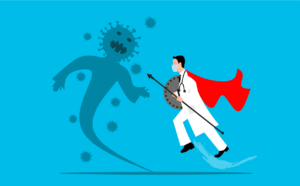Innovation in the digital health industry: Applications and devices that are revolutionizing the way we manage our health
5 min read
The Impact of Wearable Devices on Personal Health Monitoring
In recent years, there has been a significant increase in the use of wearable devices for personal health monitoring. These devices, which can be worn on the body or attached to clothing, are equipped with sensors that track various health metrics such as heart rate, sleep patterns, and physical activity. The data collected by these devices can provide valuable insights into an individual’s overall health and well-being.
One of the main benefits of wearable devices is their ability to provide real-time feedback. Unlike traditional health monitoring methods, such as periodic check-ups with a doctor, wearable devices allow individuals to continuously monitor their health throughout the day. This constant feedback can help individuals make more informed decisions about their lifestyle choices and take proactive steps to improve their health.
For example, a person wearing a fitness tracker may notice that their heart rate spikes during certain activities, indicating that they are pushing themselves too hard. Armed with this information, they can adjust their exercise routine to avoid overexertion and reduce the risk of injury. Similarly, someone wearing a sleep tracker may discover that they are not getting enough restful sleep, prompting them to make changes to their bedtime routine or seek medical advice if necessary.
Wearable devices also have the potential to improve the management of chronic conditions. For individuals with conditions such as diabetes or hypertension, monitoring key health metrics is crucial for maintaining optimal health. Wearable devices can provide continuous monitoring of blood glucose levels or blood pressure, allowing individuals to track their condition in real-time and make necessary adjustments to their treatment plan.
Furthermore, wearable devices can help individuals stay motivated and accountable for their health goals. Many devices come with built-in features that allow users to set goals, track progress, and receive rewards or incentives for meeting targets. This gamification aspect can make the process of managing one’s health more engaging and enjoyable, increasing the likelihood of long-term adherence to healthy habits.
However, it is important to note that wearable devices are not without their limitations. One of the main challenges is the accuracy of the data collected. While advancements in sensor technology have improved the accuracy of wearable devices, there is still a margin of error. Factors such as device placement, user error, and environmental conditions can all impact the reliability of the data collected.
Another concern is the privacy and security of the data collected by wearable devices. As these devices become more integrated into our daily lives, they are collecting increasingly sensitive information about our health. It is crucial for manufacturers and developers to prioritize data security and ensure that user information is protected from unauthorized access or misuse.
In conclusion, wearable devices have the potential to revolutionize personal health monitoring. Their ability to provide real-time feedback, improve the management of chronic conditions, and enhance motivation and accountability make them valuable tools for individuals looking to take control of their health. However, it is important to consider the limitations and potential risks associated with these devices. As the digital health industry continues to innovate, it is crucial to strike a balance between harnessing the benefits of wearable devices and addressing the challenges they present.
Artificial Intelligence in Healthcare: Transforming Diagnosis and Treatment
Artificial Intelligence (AI) has become a buzzword in almost every industry, and healthcare is no exception. The integration of AI in the healthcare sector has brought about significant advancements in diagnosis and treatment, revolutionizing the way we manage our health. From improving accuracy to enhancing efficiency, AI has proven to be a game-changer in the digital health industry.
One of the key areas where AI has made a tremendous impact is in the field of diagnosis. Traditionally, diagnosing complex diseases required extensive manual analysis of medical records and test results. This process was not only time-consuming but also prone to human error. However, with the advent of AI, healthcare professionals now have access to powerful algorithms that can analyze vast amounts of data in a matter of seconds. This has led to more accurate and timely diagnoses, ultimately saving lives.
AI-powered diagnostic tools have also shown great promise in detecting diseases at an early stage. For instance, machine learning algorithms can analyze medical images, such as X-rays and MRIs, to identify subtle abnormalities that may be missed by human eyes. By catching diseases in their early stages, AI enables healthcare providers to intervene sooner, leading to better treatment outcomes and improved patient prognosis.
In addition to diagnosis, AI has also transformed the way treatments are administered. Personalized medicine, which tailors treatment plans to individual patients based on their unique characteristics, has become increasingly feasible with the help of AI. By analyzing a patient’s genetic makeup, medical history, and lifestyle factors, AI algorithms can predict the most effective treatment options and potential side effects. This not only improves patient outcomes but also reduces the risk of adverse reactions to medications.
Furthermore, AI has played a crucial role in streamlining healthcare operations and improving efficiency. With the help of AI-powered chatbots and virtual assistants, patients can now access basic healthcare information and schedule appointments without the need for human intervention. This not only saves time for both patients and healthcare providers but also reduces the burden on administrative staff, allowing them to focus on more complex tasks.
AI has also paved the way for remote patient monitoring, enabling healthcare professionals to keep a close eye on patients’ health from a distance. Wearable devices equipped with AI algorithms can continuously monitor vital signs, such as heart rate and blood pressure, and alert healthcare providers in case of any abnormalities. This real-time monitoring not only improves patient safety but also allows for early intervention, preventing potential complications.
Despite the numerous benefits of AI in healthcare, there are also challenges that need to be addressed. Privacy and security concerns surrounding patient data are of utmost importance. As AI relies on vast amounts of personal health information, it is crucial to ensure that robust security measures are in place to protect patient privacy.
In conclusion, AI has revolutionized the way we diagnose and treat diseases in the digital health industry. From improving accuracy and efficiency in diagnosis to enabling personalized treatment plans, AI has proven to be a valuable tool in healthcare. As technology continues to advance, it is essential to harness the power of AI while addressing the ethical and privacy concerns associated with its implementation. With continued innovation and collaboration between healthcare professionals and technology experts, the future of AI in healthcare looks promising.


